Posted on Tuesday, February 10th, 2026
Algonquin College is celebrating Valentine’s Day with a touch of Anishinàbe language and culture. Specially made “heart pins” are available for purchase at Connections bookstore. These hand-made pins were made by crafters from Long Point First Nation in Quebec including; Lena Rodgers Polson, Mabel Rodgers, Christine Polson and Trish Polson.
for purchase at Connections bookstore. These hand-made pins were made by crafters from Long Point First Nation in Quebec including; Lena Rodgers Polson, Mabel Rodgers, Christine Polson and Trish Polson.
As part of our ongoing commitment to honouring and preserving Indigenous languages, this Feb. 14 we’re sharing a few heartfelt phrases that offer a fun and meaningful way to brighten someone’s day. Read more >
Posted on Friday, February 6th, 2026
On Wednesday, Feb. 4 Algonquin College’s Mamidosewin Centre hosted an inspiring and immersive event featuring acclaimed actors Claudia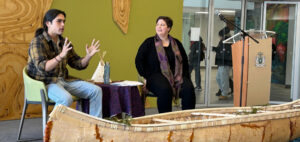 Jurt and Joshua Odjick.
Jurt and Joshua Odjick.
The interactive conversation and workshop welcomed Indigenous students, alumni, faculty and a group of students from Algonquins of Barriere Lake for a conversation about the acting industry. Read more >
Posted on Wednesday, February 4th, 2026
Algonquin College officially opened its new state-of-the-art Pìwànak — Algonquin Centre for Science and Innovation (PACSI) on Feb. 2, 2026. Featuring more than 20,000 square feet of cutting-edge lab space, PACSI will serve as an unprecedented resource for science education and research in Ottawa and beyond. Read more >
2026. Featuring more than 20,000 square feet of cutting-edge lab space, PACSI will serve as an unprecedented resource for science education and research in Ottawa and beyond. Read more >
Posted on Tuesday, January 27th, 2026
On Tuesday, Jan. 27, 2026, Algonquin College hosted the Ottawa Indigenous Student Career Fair (OISCF), where students and recent graduates from Algonquin College, Carleton University, College La Cité, and the University of Ottawa were able to meet with potential employers.
Employers who attended the event included PCL, Altis Recruitment, the Ottawa Aboriginal Coalition, Nokia Canada, Ricoh Canada, Ottawa Public Library, RCMP, Anishinabek Police Services, Ottawa Police Services, CSIS, TD Bank, City of Ottawa and many more.
Current and former students had the opportunity to speak with companies about their businesses and learn more about hiring and what they need to do to begin a career in a chosen field.

Read more >
Posted on Wednesday, January 21st, 2026
A joint event between Wellness & Abilities and Indigenous Initiatives was held today in Kejeyàdizidjigwogamig (third-floor library) as part of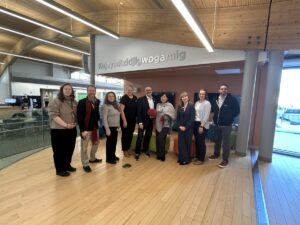 the Blue Monday week of activities.
the Blue Monday week of activities.
The Indigenous Friendship Circle activity allowed participants to meet new colleagues and learn about each other.
The “We Are All Connected” yarn circle brought participants together to share their favourite rivers in Canada. Standing in a circle, they tossed a ball of yarn from person to person while holding on to a strand, creating a web in the center. Read more >
Posted on Tuesday, January 20th, 2026
A powerful new initiative is taking shape at Algonquin College. Soaring Circle, a national Outaouais-based non-profit, announced the launch of its Sewcase Skills Lab at Algonquin College’s Mamidosewin Centre today to empower and support over 1,000 Indigenous students in a way that is respectful and reflective of Indigenous cultures.
of its Sewcase Skills Lab at Algonquin College’s Mamidosewin Centre today to empower and support over 1,000 Indigenous students in a way that is respectful and reflective of Indigenous cultures.
Soaring Circle is equipping the Mamidosewin Centre with state-of-the-art Janome sewing machines, specialized equipment, textiles, curriculum support and mentorship from Indigenous creators and global brand experts, bridging cultural learning with industry exposure. Read more >
Posted on Tuesday, January 13th, 2026
TRI Year in Review
Algonquin College’s commitment to Truth and Reconciliation included a wide range of opportunities for Indigenous learning in 2025. Here’s a look back and the many ways the College community was able to learn and connect with the Anishinàbe people and culture.
a look back and the many ways the College community was able to learn and connect with the Anishinàbe people and culture.
December
Dec. 5 – Winter solstice marked early with Indigenous folklore Read more >
Posted on Monday, December 15th, 2025
On Dec. 15, 2015 the Truth and Reconciliation Commission of Canada released their final report titled “Honouring the Truth, Reconciling for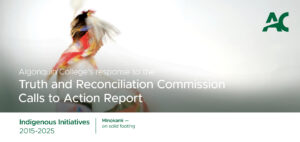 the Future”. The report issued 94 Calls to Action for reconciliation with Indigenous peoples.
the Future”. The report issued 94 Calls to Action for reconciliation with Indigenous peoples.
Algonquin College is proud to reflect on more than a decade of reconciliation efforts inspired by the Truth and Reconciliation Commission’s Calls to Action. Guided by Indigenous voices, the College has introduced programs, services, and partnerships that expand supports for Indigenous learners, integrate Indigenous knowledge into curriculum, and create spaces that honor Indigenous cultures and traditions. A report of our work over the past decade can be read here. Read more >
Posted on Wednesday, November 26th, 2025
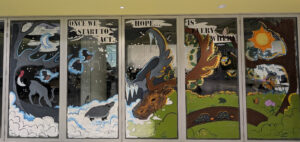
Pictured: One of three student murals created in Algonquin College’s DARE District (Building C) by Illustration and Concept Art students during the Cause a Scene initiative.
On Nov. 13, Algonquin College hosted an Indigenous-led climate dialogue that inspired 55 Illustration and Concept Art students. Their murals and AR activations remain on display in DARE District until mid-December.
The day began with a powerful multigenerational dialogue featuring Chuck Commanda, master canoe builder and Indigenous Knowledge Keeper, Vanessa Stevens, Indigenous counsellor from the Mamidosewin Centre, and Amenda Soucy, Inuk student entrepreneur from the Business Management and Entrepreneurship program. Throughout their discussion, they invited employees, learners, and community members to reflect on our shared responsibilities to the land and to future generations. Read more >
Posted on Friday, November 21st, 2025
On Thursday, Nov. 20, 2025, employees and learners got a head start on the holiday season as they took part in an Indigenous themed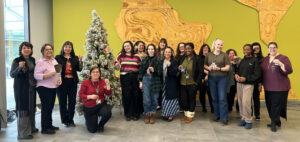 ornament-making workshop.
ornament-making workshop.
Anita and Jenny Tenasco guided participants though creating ornaments using traditional Indigenous crafting methods and natural land-based materials including wood pieces, pinecones, feathers, birchbark and leather.
The creativity abounded as participants enjoyed festive music, snacks and good conversation. Read more >
 for purchase at Connections bookstore. These hand-made pins were made by crafters from Long Point First Nation in Quebec including; Lena Rodgers Polson, Mabel Rodgers, Christine Polson and Trish Polson.
for purchase at Connections bookstore. These hand-made pins were made by crafters from Long Point First Nation in Quebec including; Lena Rodgers Polson, Mabel Rodgers, Christine Polson and Trish Polson. Jurt and Joshua Odjick.
Jurt and Joshua Odjick. the Blue Monday week of activities.
the Blue Monday week of activities. of its Sewcase Skills Lab at
of its Sewcase Skills Lab at  a look back and the many ways the College community was able to learn and connect with the Anishinàbe people and culture.
a look back and the many ways the College community was able to learn and connect with the Anishinàbe people and culture. the Future”. The report issued
the Future”. The report issued 
 ornament-making workshop.
ornament-making workshop.